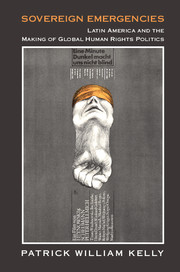'In this lucid, informed, and clear account, Kelly shows how a succession of regimes in the 1960s, 70s and 80s chose the human body as their staging ground for ideological warfare, and how out of these nightmares the defense of what came to be known as human rights was born. An indispensable history of modern Latin America.'
Alma Guillermoprieto - former journalist for The Guardian, the Washington Post, and The New York Times, and author of The Heart that Bleeds: Latin America Now
'This book is an important contribution to the history of human rights discourse and activism from a transnational perspective that documents and analyzes an important process that took place in the 1970s regarding the way Latin American exiles and those concerned about the wave of repression in South America responded to reports of arrest, torture, and the disappearance of political activists.'
James Green - Carlos Manuel de Céspedes Professor of Modern Latin American History, Brown University, Rhode Island
'Finally, a careful and thoroughly researched study on the contributions of Latin America to the international human rights canon. The last few decades have greatly expanded the substance of what we consider rights, and incorporated the 'language of rights' into all areas of public policy. In that recent history, Latin American advocates, jurists and human rights defenders have created models that break barriers of cultural relativism and contribute to the universality of human dignity from the lessons of tragedy and triumph that are so eloquently described in these pages.'
Juan E. Méndez - American University, Washington, DC, and Commissioner, International Commission of Jurists
'Patrick William Kelly’s first book is an important contribution to the burgeoning literature on the human rights revolution of the 1970s … [It] offers insightful comments about the role of Latin American exiles in this revolution, includes fascinating digressions about testimonial truth, and, all in all, provides a successful model to those interested in writing empirically grounded transnational histories.'
Alfonso Salgado
Source: Journal of Contemporary History
'Sovereign Emergencies is a rich kaleidoscope that emphasizes the importance of writing histories that underscore plurality in the formation of the ideas and practices that animate international politics. In doing so, Kelly offers a new view of global politics as a process that does not occur top-down but in a multitude of directions that can be grasped only by portraying diverse encounters.'
Jorge González-Jácome
Source: The Journal of Interdisciplinary History
‘Kelly has managed to write a convincing and detailed account not only about transnational human rights activism in the Americas and Western Europe, but has also made an important contribution to the still recent historiography on human rights more generally. The author has achieved this by pointing out the importance for detail, nuance, and clarity when dealing with the different aspects of human rights and its 'breakthrough' in the 1970s.’
Philipp Kandler
Source: Global Histories
‘Sovereign Emergencies is a fantastic read. It foregrounds Latin America in the human rights revolution of the 1970s, offers insightful comments about the role of Latin American exiles in this revolution, includes fascinating digressions about testimonial truth, and, all in all, provides a successful model to those interested in writing empirically grounded transnational histories.’
Alfonso Salgado
Source: Journal of Contemporary History





